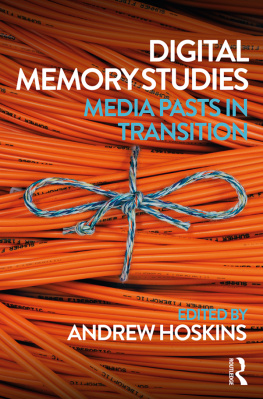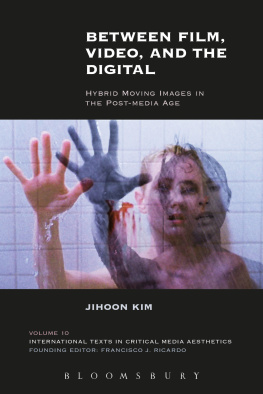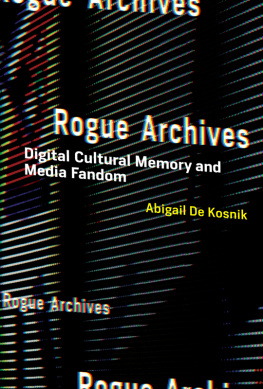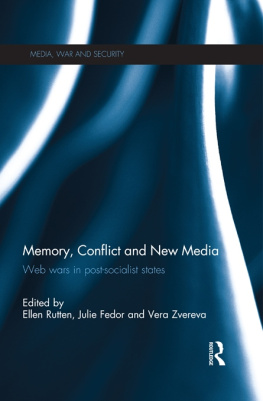First published 2018
by Routledge
711 Third Avenue, New York, NY 10017
and by Routledge
2 Park Square, Milton Park, Abingdon, Oxon OX14 4RN
Routledge is an imprint of the Taylor & Francis Group, an informa business
2018 Taylor & Francis
The right of Andrew Hoskins to be identified as the author of this work has been asserted by him in accordance with sections 77 and 78 of the Copyright, Designs and Patents Act 1988.
All rights reserved. No part of this book may be reprinted or reproduced or utilised in any form or by any electronic, mechanical, or other means, now known or hereafter invented, including photocopying and recording, or in any information storage or retrieval system, without permission in writing from the publishers.
Trademark notice: Product or corporate names may be trademarks or registered trademarks, and are used only for identification and explanation without intent to infringe.
Library of Congress Cataloging-in-Publication Data
Names: Hoskins, Andrew, 1967 editor.
Title: Digital memory studies : media pasts in transition / edited by
Andrew Hoskins.
Description: New York : Routledge, 2017.
Identifiers: LCCN 2017002790 | ISBN 9781138639379 (hardback) |
ISBN 9781138639386 (pbk.)
Subjects: LCSH: Mass mediaSocial aspects. | Digital mediaSocial aspects. |
Collective memory.
Classification: LCC HM1206 .D53 2017 | DDC 302.23/1dc23
LC record available at https://lccn.loc.gov/2017002790
ISBN: 978-1-138-63937-9 (hbk)
ISBN: 978-1-138-63938-6 (pbk)
ISBN: 978-1-315-63723-5 (ebk)
Typeset in Bembo
by Apex CoVantage, LLC

Matthew Allen lectures in cultural economy at the University of Leicester, UK. He is author of The Labour of Memory: Memorial Culture and 7/7 (Palgrave, 2015). His research on memory and digital culture has been published in Memory Studies, Theory & Psy chology, and Organization . He is editor of Memory Studies and a member of the editorial collective for the open access journal ephemera: theory & politics in organization.
Tim Barker is a Lecturer in Digital Media in the School of Culture and Creative Arts, University of Glasgow. His research interests include the philosophy of time and media, German media theory, questions of technology and creativity and histories of experimental audio-visual media. He is the author of Time and the Digital (Dartmouth College Press, 2012) and a number of essays and book chapters on topics related to the materially oriented studies of media.
Having been academically trained as a historian and classicist (Latin Philology and Classical Archaeology) with an ongoing interest in cultural tempor(e)alities, Wolfgang Ernst grew into the emergent technology-oriented media studies and is Full Professor for Media Theories in the Institute for Musicology and Media Studies at Humboldt University in Berlin since 2003. His academic interests once focused on historicism, archival theory and museology, before attending to media-technical matters. His current research focus covers media archaeology as method, theory of technical storage, technologies of cultural transmission, micro-temporal media aesthetics and their chronopoetic potentials, critique of history as master discourse of cultural and technological time, and sound analysis (sonicity) from a media-epistemological point of view, that is time signals. Books in English: Digital Memory and the Archive (University of Minnesota Press, 2013); Stirring in the Archives. Order from Disorder (Rowman & Littlefield, 2015); Chronopoetics. The temporal being and operativity of technological media (Rowman & Littlefield, 2016); Sonic Time Machines. Explicit Sound, Sirenic Voices and Implicit Sonicity in Terms of Media Knowledge (Amsterdam University Press, 2016).
Joanne Garde-Hansen is Reader in Culture, Media and Communication, Centre for Cultural Policy Studies, University of Warwick, UK. She was Reader in Media at the University of Gloucestershire and Director of the Research Centre for Media, Memory and Community. Joanne is the author and co-editor of a number of books and articles on media, memory, emotion and environmental studies, including Emotion Online: Theorizing Affect on the Internet (Palgrave Macmillan, 2013); Geography and Memory (Palgrave Macmillan, 2012); Media and Memory (Edinburgh University Press, 2011); and Save As Digital Memories (Palgrave Macmillan, 2009). She has been collaborating with the Museu da Pessoa, So Paulo, Brazil and working with UK and Brazil colleagues on Flood Memories, Drought Narratives and mediating resilience through memory work.
Andrew Hoskins is Interdisciplinary Research Professor in the College of Social Sciences at the University of Glasgow. His latest book is (with John Tulloch) Risk and Hyperconnectivity: Media and Memories of Neoliberalism (Oxford University Press, 2016) and Broken Media (with Catherine Happer) is forthcoming with Palgrave Macmillan. His AHRC Research Fellowship interrogates the intersecting and contesting roles of individual and organisational memory of warfare through an original ethnography of Army Historical Branch in Whitehall (the keepers of the official operational record of the British Army) http://archivesofwar.com. He is founding Editor-in-Chief of the Sage journal of Memory Studies, founding Co-Editor of the Palgrave Macmillan book series Memory Studies and founding Co-Editor of the Routledge book series Media, War & Security . @andrewhoskins.
Wulf Kansteiner is Professor of History at Aarhus University, Denmark. A cultural and intellectual historian of twentieth-century Europe, Kansteiner has published widely in the fields of media history, memory studies, historical theory, and Holocaust studies. He is the author of In Pursuit of German Memory: History, Television, and Politics after Auschwitz (Ohio University Press, 2006) and coeditor of The Politics of Memory in Postwar Europe (Duke University Press, 2006), Historical Representation and Historical Truth (2009), Den Holocaust erzhlen: Historiographie zwischen wissenschaftlicher Empirie und narrative Kreativitt (Wallstein Verlag Gmbh, 2013), and Probing the Ethics of Holocaust Culture (Harvard University Press, 2016). He is also co-editor of the journal Memory Studies.
Amanda Lagerkvist is Associate Professor of Media and Communication Studies and Wallenberg Academy Fellow in the Department of Media Studies at Stockholm University. She is head of the research program Existential Terrains: Memory and Meaning in Cultures of Connectivity (et.ims.su.se), funded by the Knut and Alice Wallenberg Foundation, the Marcus and Amalia Wallenberg Foundation, and Stockholm University (20142018). She works in the fields of media philosophy and media memory studies, developing an existential media theory in relation to digital (memory) cultures, with a particular focus on death online. As a media phenomenologist she has contributed to debates on media, memory, time, urban space and performativity. She is the author of the monograph Media and Memory in New Shanghai: Western Performances of Futures Past (Palgrave Macmillan, 2013). She is also the co-editor of Strange Spaces: Explorations into Mediated Obscurity (Ashgate, 2009) and has published in, for instance, New Media and Society, Television and New Media, The New Review of Hypermedia and Multimedia, Sociological Review, Space and Culture, The Senses and Society, The European Journal of Communication and The International Journal of Cultural Studies.
Michael Moss is Professor of Archival Science at Northumbria University, Newcastle upon Tyne. He previously held a chair in the Humanities Advanced Technology and Information Institute at the University of Glasgow. He is by background an archivist and historian. He has written widely on archival topics, for example Where have all the files gone, lost in action points every one? ( Journal of Contemporary History , 2012). He is a non-executive director of the National Records of Scotland and was, until 2014, a member of the Lord Chancellors Advisory Council on National Archives and Records. He was Miegunyah Distinguished Fellow in the e-Scholarship Research Centre at the University of Melbourne in 2014. Last year he edited with Barbara Endicott Popovsky: Is Digital Different? How information creation, capture, preservation and discovery are being transformed (Facet, 2016) and published La campagne en faveur des conomies de guerre en Grande Bretagne: naissance dune politique modern de lepargne (in F. Descamps and L. Quennouelle-Corre, La mobilisation financire pendant la Grande Guerre , (Comit pour lhistoire conomique et financire de la France, 2016).








